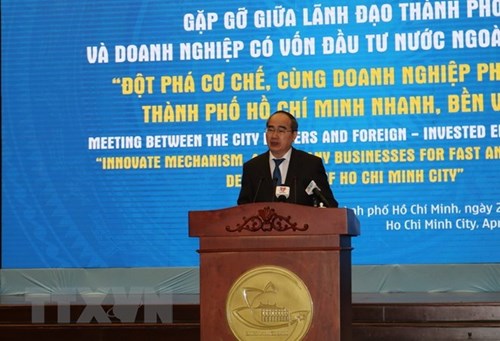The event on April 21 drew representatives of foreign businesses’ associations and nearly 200 FDI companies in Ho Chi Minh City.
Secretary of the municipal Party Committee Nguyen Thien Nhan said over the past years, Ho Chi Minh City has made efforts to improve investment climate, step up administrative reforms, streamline procedures, increase transparency and boost IT application in the settlement of administrative procedures to enhance the attractiveness to foreign investment.
    |
 |
|
Secretary of the municipal Party Committee Nguyen Thien Nhan speaks at the meeting |
As a result, the city attracted 6.6 billion USD in FDI in 2017, surging over 90 percent from the previous year. In the first quarter of 2018 alone, the figure stood at 1.37 billion USD, compared to 5.8 billion USD of the entire country.
However, he said, Ho Chi Minh City is also facing an array of challenges typical of a big city such as outdated transport system, and overloading in infrastructure, hospitals, schools and housing due to rapid population growth. Meanwhile, heavy climate change impacts and risks of serious flooding have also negatively influenced local people’s life and businesses’ activities.
Secretary Nhan called on FDI enterprises to take part in key socio-economic development projects, noting that the city particularly encourages them to suggest measures and share experience in building a smart city.
He affirmed that Ho Chi Minh City considers businesses and people’s satisfaction as the meter of the development and efficiency of its administrative apparatus’ performance.
At the meeting, many FDI companies described Ho Chi Minh City as a dynamic city with fast growth rate and a destination drawing foreign investors’ interest. However, they also said to attract foreign capital for fast and sustainable development and smart city building, the city will have to tackle policy and human resources problems.
A representative of the European Chamber of Commerce in Vietnam (EuroCham Vietnam) said European companies wants Ho Chi Minh City to put forth more open and transparent policies. The legal system regarding investment activities needs to be consistent in both theory and practice. It is also necessary to improve the quality of human resources, not only manual workers but also middle- and high-level manpower, in order to meet foreign businesses’ demand.
Sharing the same view, Saranya Skontanarak, Chairwoman of the Thai Business (Vietnam) Association, said manpower quality not only affects the attractiveness to foreign investment but also serves as a decisive factor of smart city building success.
She added Ho Chi Minh City, and on a larger scale, Vietnam, no longer has labor cost advantages. Therefore, the city must have solutions to promote labor productivity and quality. Building a smart city requires not only modern technology but also capable personnel to operate the system and enjoy the benefits it will generate.
Seck Yee Chung, Vice President of the Singapore Business Group - Ho Chi Minh City Chapter, said Ho Chi Minh City and many other cities in Vietnam want to build smart cities, which is a necessary step toward modernizing cities and solving hot issues pertaining to transport infrastructure, environment and database.
Singapore is experienced in smart city building and technology-based development, and it is ready to help Ho Chi Minh City and Vietnam. However, he said, the country needs policies which are more open to investment in technology services.
Source: VNA